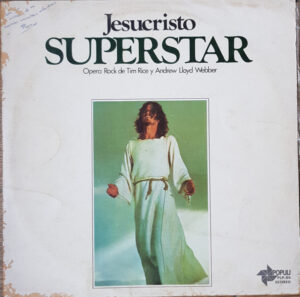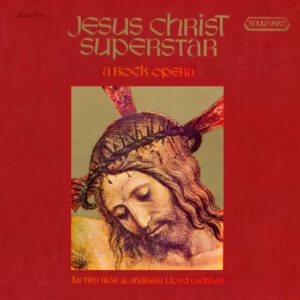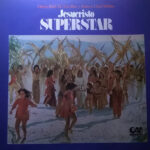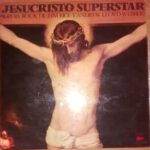Artwork
Explore
Cast
Jesus of Nazareth…………Colin Dyall
Judas Iscariot…………Mick Tulk
Mary Magdalene…………Marlene Samuels
King Herod…………Larry Dyall
Simon Zealotes…………David Rockwell*
Caiaphas…………John Wheeler
Annas…………Derek Martin**
Group Vocals…………The Carols
* indicates that listening suggests Colin Dyall actually sang this role; however, a Spanish release gave an alternate name in its liner notes (which has no other credits elsewhere, suggesting this is merely an alias), so this had to be addressed.
** indicates that listening suggests Mick Tulk actually sang this role; however, a Spanish release gave an alternate name in its liner notes, so this had to be addressed.
Track Listing
Side 1:
Hosanna
Simon Zealotes / Poor Jerusalem
Everything’s Alright
Heaven On Their Minds
What’s The Buzz / Strange Thing, Mystifying
Side 2:
This Jesus Must Die
Everything’s Alright
King Herod’s Song
Judas’ Death
I Don’t Know How To Love Him
Superstar / Crucifixion
Orchestra
1st Guitar: Stan Chaman
2nd Guitar: John Wheeler
Bass: Clive Chaman
Piano, Mellotron: Chris Goodey
Drums: Ed Spevok
Flute: Colin Dyall
Audio Production Information
Directed and Produced by Colin Dyall at Saga Sound Studios, 15 Maresfield Gardens, London NW3
Recording Engineer: Richard Charles
Sleeve Design: Terry Shannon
Front reproduction (Boulevard release only): Angelico, detail from “The Crucifix and St. Dominic”
Copyright Art & Sound Ltd., 1974.
Historical Notes from a Fan
When any show is a hit, a lot of people will be quick to capitalize on the show’s success. In this case, Jesus Christ Superstar was one of the first albums of its kind, and everyone wanted their slice of the pie where the Passion According to Tim and Andrew was concerned. At this time, many “budget” labels famous for releasing low-cost sound-alike albums (“knock-off” recordings capitalizing on shows, songs, or albums that became hits) jumped into the fray.
The performers were usually never an actual ensemble that had performed JCS (indeed, in its early days, the number of actual casts performing the show was very few), but instead merely a group of vocalists who recorded songs from the show. Usually, these recordings were very cheaply put together and produced, and priced to own. (In the future, albums like these, now labeled “studio cast recordings,” could no longer be accurately described as simple cash grabs, but at the time, the use of the phrase “knock-off” is appropriate.) Though it may be a matter of opinion, this particular fan feels that since the performers on these studio recordings lack the experience of getting on a stage and performing the show in front of an audience, the performances are pleasant enough, but not always up to par with a real cast album.

This recording is noteworthy for several reasons. First, owing possibly to an earlier release date than has been previously noted in past discographies (on which JCS Zone’s was based, though research on Discogs has turned up possible earlier releases), this album boasts some of the longest — and most defensive, if passive-aggressive — liner notes this historian has ever seen on a “knock-off” recording, starting with ass-kissing bios for Rice and Webber, and moving into a philosophical treatise whining about not being allowed to print the lyrics on the sleeve for copyright reasons with the most astounding bullshit-logic argument outside of kids imploring that their parents “let me be me.” They are printed in their entirety below.
The Writers
TIM RICE (left) and ANDREW LLOYD WEBBER (right) are a team to conjure with. For they have created a Messiah for today. Lovers of music in its classical origins — our Golden Age of the musical art form — may be horrified by this thought. But it is truth — today’s truth. The essence of a classic is that it endures. We, at Saga Records, are satisfied that Jesus Christ, Superstar, will endure. Americans have bought 2 million copies to date (May 1971) at 5 pounds a set of records.
Their previous 2-man oratorio — Joseph — became a “classic” sub rosa. Never issued as a record, not given a Broadway or West End introduction, it was “found” — a sort of treasure trove — by countless choral, dramatic, and school and university Societies, plus numerous pop groups. They wrote it in 1968. It is now being recorded and acclaimed. Its full title is Joseph and the Amazing Technicolour Dreamcoat.
Tim Rice is the Word Man. Andrew Lloyd Webber is the Music Man. They were not born to greatness. They have had no greatness thrust upon them. They have achieved it. Tim was born in Buckinghamshire in 1944; Andrew in London in 1948.
[…]
Jesus, our saviour was a hippy.
Perhaps this is the first time that an Opera or Oratorio has ever been issued on disc without the printed text because of the publishers’ refusal to permit a recording company to print the text, despite our offer to pay any reasonable literary royalty.
Many interesting features arise. Firstly, to blow loud and hard upon the trumpets of two brilliant young men — Colin Dyall, our producer, and Richard Charles, our sound engineer, — unlike some versions of operatic work on record our recording requires no oratorio because every word is audible and distinguishable and the text is, therefore, manifest from the recording itself.
The greatness of the work contained upon this record has been dealt with (in part) in the biographical notes of its author and its composer and even this too is worthy of an explanatory note.
Originally we were informed that we would not even be permitted to print photographs of the author and the composer. But that was a minor novelty compared to the greater ones yet to be disclosed. The notion that Tim Rice and Andrew Lloyd Webber were already public figures whereby their faces fell within the public domain had presumably not occurred to those who “warned us off”, so to say.
The major novelty resides within the fact that the Bible in England is copyright. Not so in America; not so elsewhere in the world to our knowledge. But England has so much which makes it distinguished. Where else in the world is a Monarchy to be found whose incumbent for the Time Being is the Defender of the Faith? Copyright of literary works extends for 50 years after the author’s death. But the Crown copyright in the authorized King James’ version extends in perpetuity.
All copyright owners of literary works own all rights respecting abridgement and adaptation. We wonder if Tim Rice wrote the Queen or the appropriate department of the Palace to request such rights of adaptation not only with respect to Jesus Christ Superstar an adaptation for today (and tomorrow?) of the Trial of Jesus and the Passion, but also for his earlier work with Joseph. If he failed to do so was he in breach of a Crown copyright? We have taken the precaution of obeying the Superstar Super-Right of the publishers — Leeds Music — which prohibits us from setting up in print the oratorio.
Was Jesus a hippy? By the standards of His own day — the long-hair who came not to destroy but to change — He started His revolutionary life as a hippy, tout seul; but once His disciples were around Him and His following substantial, Jesus became more than a Man, more than the Son of God; He became a Movement.
He was a Jew who believed that God was One, Eternal, Ubiquitous, Omniscient, Universal. He was the God of all men and the Creator of all things.
In Jesus’ own language, He told His own day’s Establishment — “Stop polluting our faith! Stop polluting God!”
The author and composer have sub-titled their great work a Rock Opera. Rock is today’s idiom for a musical form accepted by the hippies or the Flower People (or whatever they call themselves tomorrow). They like not what they see. They like not what they knew, but only what they know now — their new convictions, their new truths, their new found aspirations for a Society which is not to be destroyed, but changed.
Jesus, likewise, liked not the Society of His own day and in His castigations of it brought upon Himself a most powerful dramatic finis to a life which, to those of use who have faith, was only The Beginning.
This message, this faith, is what Jesus Christ-Superstar is all about; but there could be no more unjust assessment of it to think of it as for hippies only. For it is the New Testament renewed.
It is for all of us.
Classic hornswoggling if ever there was. (I wish I could hire whoever that guy was to write liner notes for my work.)
This album is also noteworthy for containing the most… let’s call it confusing… version of “King Herod’s Song” ever recorded. Attempting to skirt copyright (as the defensive liners would suggest) and noticing that some of the words of “Gethsemane” scan to the melody of “King Herod’s Song” if one tries (though why one would, I have no idea), the arrangers of this album came up with a strange lyrical hybrid of “King Herod’s Song” and “Gethsemane” which they proceeded to record under the former title, with no differentiation of character in the solos and no further explanation. It’s an interesting smooth soul (bordering on light reggae) treatment of the “Herod” melody, but the lyrics clash jarringly with each other and with the arrangement. It’s worth hearing if only to stand in awe of this incredibly silly choice.
Reviews
I can’t believe I’m writing a review for this in 2023; how perfection sounds
Ian Gillian who?
A small little review of possibly the best record in my collection.
Having bought this ages ago for roughly 50 cents in a thrift store, I had forgotten about it. Until this record resurfaced after cleaning out a closet, And let me tell you – this record will never be cleaned out.
Great solos, amazing vocalists who for some reason never became well-known, and compositions that’ll leave you head-scratching whilst also in awe of what music can do.
Impossible how these artists weren’t originally casted for the soundtrack or the movie. It amazes me to see how cheap these albums are. I have a collection of around 10 different JCS records and let me tell you, this sure is one of them.
As to not lie on the submission form, obviously this review is a joke and the music on this album is absolutely (but more important, hilariously) terrible.
Drive safe.
Strange, cheap, but somehow vaguely appealing: a 2023 review
This was the first LP I ever owned, probably bought by my father to familiarise us with the music of JCS before we saw the stage show in 1973.
At the time, as a very non-discerning 12yo, I really enjoyed this album. However, once I’d seen the quite superb Australian production at the Palais Theatre in St Kilda, in Melbourne, Australia, and subsequently paid up for the official Australian cast soundtrack album, the shortfalls of the Sagapan offering quickly became apparent.
Even now, though, 50 years on, I still give kudos to the group of apparent amateurs who put this album together. Musically, it’s very thin – a couple of guitars, a piano, drums and a flute. The small number of singers share roles; for instance, Colin Dyall sings the roles of both Jesus and Simon Zealotes, Mick Tuck is Judas and Annas. Larry Dyall (presumably Colin’s brother) is Herod. A vocal group, The Carols, is also credited. I’m guessing The Carols, at best, were a duet. And not particularly melodic.
Although they all seem to be trying their best, the sad fact is that few of the cast can actually sing very well. Colin Dyall, who, as well as singing Jesus and Simon, is listed as the producer and director of this record, and that can be the only reason he got to sing that role. He goes wonderfully off-key in the first line of “Hosanna”, and in “What’s the Buzz” he sings almost comically flat, in an effort to express emotion. His monologue in “The Crucifixion” (infused with a flute playing “I Don’t Know How to Love Him”), sounds as agonising and emotional as someone reading the clues from a crossword puzzle. I’ve Googled him, but I can’t find any details what happened to Colin’s career and life after this record. I’d really like to know what became of him. Perhaps he became a bank manager, or a bookkeeper.
Mick Tuck, as Judas, is probably the best of this lot. But that’s not saying a great deal.
Not only do the vocalists murder the songs, but many of the songs on this album are bizarrely arranged, for no apparent reason. For instance, “What’s the Buzz/Strange Things Mystifying” actually starts with the latter half of “Mystifying”, then segues back to “What’s the Buzz”, before concluding with the Judas part of “Mystifying”. It’s nonsensical. “Herod’s Song” is sung with a completely melody, and at points, different lyrics are inserted.
Other oddities: Track 3, Side 1 is listed as “Everything’s Alright”, when it’s actually “I Don’t Know How to Love Him”. The songs, as presented on the record, are out of sequence. We hear “Hosanna” before “This Jesus Must Die”, “I Don’t Know How to Love Him” before “Everything’s Alright”, “Simon Zealotes” before “Heaven on Their Minds”. It’s only on the second half of Side 2, with the weird version of “Herod’s Song”, “Judas’ Death”, “Superstar” and “The Crucifixion”, ending the record in some sort of logical progression.
And for some reason, every song ends with a fade-out, rather than simply ending, as they’re supposed to. If Colin is still alive, and still lucid, I would love to ask him about the making of this album, how he managed to put this wonderful mess together.
Having said all this, despite its crude production values and the serious lack of talent within, I still have a fondness for this record. It *was* my introduction to “Jesus Christ Superstar”, znd for that, I’m grateful to them. I’m sure Colin and friends had the best intentions when they met up in Saga Sound Studios in London in 1971 to make their dreadful masterpiece.



